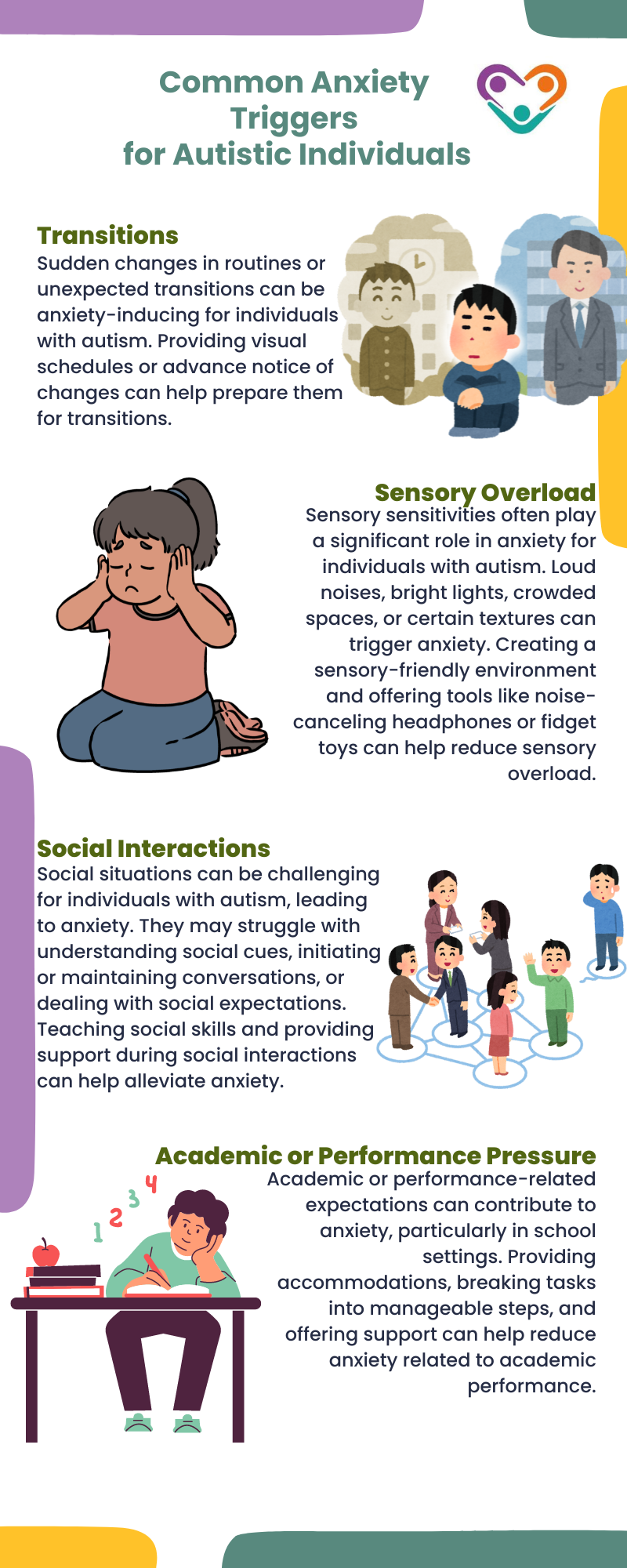Anxiety is a significant concern for individuals with autism that affects a substantial portion of the autistic population. While anxiety is not part of the diagnostic criteria for autism, it is estimated that about 40% of autistic individuals also experience significant anxiety. This is especially true for autistic individuals with a high level of empathy.
The challenges faced by autistic individuals, such as sensory assaults, bullying, communication difficulties, and social interactions, contribute to the development of anxiety. These factors can create overwhelming situations that lead to heightened anxiety levels.

What Causes Anxiety in Autistic Individuals
Autistic people often experience heightened sensory sensitivities and have difficulty processing and integrating sensory information. This sensory overload can trigger anxiety and distress. Additionally, the social challenges faced by individuals with autism, such as difficulty understanding social cues and navigating social interactions, can contribute to the development of social anxiety.
It is important to note that anxiety symptoms can sometimes be challenging to differentiate from autism traits. Autistic individuals may exhibit behaviors that could be misunderstood as anxiety but are actually related to their neurodevelopmental condition.
Communication difficulties can also make it challenging for autistic individuals to express their emotional state, making it harder to recognize and describe anxiety.
How to Manage Anxiety in Autistic Individuals
Managing anxiety in individuals with autism requires a multifaceted approach that addresses the unique needs of each individual. Let’s look at some effective strategies for doing so.
Identifying Anxiety Triggers
Identifying the specific triggers that contribute to anxiety in individuals with autism is an important first step in managing their anxiety effectively. These triggers can vary from person to person and may include situations, environments, sensory stimuli, or social interactions.
Here are some common anxiety triggers for autistic individuals:

Removing Anxiety-Provoking Situations
Once anxiety triggers have been identified, it is important to take steps to remove or minimize exposure to anxiety-provoking situations. This can involve making environmental modifications, establishing routines, and providing support.
Here are some strategies that can help:
- Create a calming environment – Designate a quiet and comfortable space where the individual can retreat to when feeling overwhelmed. This space can be equipped with sensory tools, such as weighted blankets or calming music, to promote relaxation.
- Establish predictable routines – Creating a structured daily routine can help reduce anxiety by providing a sense of predictability and stability. Visual schedules or timers can help aid individuals with autism in understanding and following the routine.
- Provide clear communication – Clear and concise communication is essential in reducing anxiety. Using visual supports, visual aids, or social stories can help individuals with autism understand expectations and reduce uncertainty.
- Offer emotional support – Providing emotional support and reassurance is vital in managing anxiety. Offering comfort, validating feelings, and teaching coping strategies can help individuals with autism navigate and cope with their anxiety.
By identifying anxiety triggers and removing anxiety-provoking situations, caregivers and individuals with autism can take significant steps toward managing anxiety effectively. It is important to remember that each individual is unique, and strategies may need to be tailored to their specific needs and preferences.
Working closely with professionals and incorporating therapies or medications when necessary can further support the management of anxiety in autism.

Support for Anxiety in Autism
Supporting individuals with autism who also experience anxiety requires a multi-faceted approach. This involves a combination of therapies and, in some cases, medication.
Therapies play a crucial role in managing anxiety in individuals with autism. One effective therapy is cognitive-behavioral therapy (CBT), which focuses on identifying and modifying negative thought patterns and behaviors. CBT is particularly beneficial for individuals with autism who have adequate verbal skills. It has shown effectiveness in treating anxiety disorders and obsessive-compulsive disorder (OCD) in this population.
Another therapy that can be helpful is social skills training. This therapy aims to enhance social interaction and communication skills, which can alleviate social anxiety in individuals with autism. By providing strategies and support, social skills training can empower individuals to navigate social situations with greater ease and confidence.
Additionally, some individuals benefit from occupational therapy. This therapy focuses on addressing sensory sensitivities and providing coping strategies for sensory overload. By creating accommodations and implementing sensory-based interventions, occupational therapy can help reduce anxiety related to sensory sensitivities.
Medication Options for Anxiety
In certain cases, medication may be considered as part of the treatment plan for anxiety in individuals with autism. However, it’s important to note that medication should always be prescribed and monitored by a qualified healthcare professional. Medications commonly used to manage anxiety in autism include selective serotonin reuptake inhibitors (SSRIs) and anti-anxiety medications.
SSRIs are a type of antidepressant that can help alleviate anxiety symptoms. They work by increasing the availability of serotonin, a neurotransmitter involved in mood regulation. SSRIs can be effective in reducing anxiety and improving overall well-being in individuals with autism.
Anti-anxiety medications, such as benzodiazepines, may be prescribed in certain situations. These medications can provide short-term relief from anxiety symptoms. However, they are typically used cautiously due to the potential for dependence and side effects.
It’s essential to have open and ongoing communication with a healthcare professional to determine the most appropriate therapy and medication options for managing anxiety in individuals with autism. Each person’s needs are unique, and a personalized approach is crucial to ensure optimal support and treatment.
By utilizing therapies and, when necessary, medication options, individuals with autism can receive the support they need to effectively manage their anxiety. This comprehensive approach aims to enhance their overall quality of life and promote their well-being.
Research continues to shed light on the neurological basis of sensory issues in autism, offering hope for more targeted and effective therapies in the future. By recognizing and addressing sensory processing difficulties, we can improve the quality of life for individuals with autism and their families. If you’re seeking specialized ABA therapy in New Jersey, Indiana, Georgia, and New York, Golden Care offers comprehensive services tailored to meet the unique needs of each individual. Contact us to learn more or book a consultation today.
Sources:
https://attwoodandgarnettevents.com/20-tips-for-managing-anxiety-for-autistic-individuals
https://www.verywellhealth.com/anxiety-and-autism-4428086
https://www.autism.org.uk/advice-and-guidance/professional-practice/anxiety-parental



